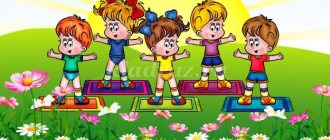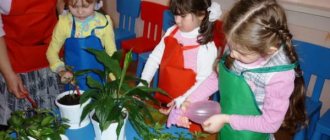Modern approaches to labor education of preschool children in the light of the Federal State Educational Standard for Education.
| Forms of labor organization | ||
| Order | Duty | Teamwork |
2. Labor education of children in the middle group of kindergarten.
Self-service.
Create conditions for the manifestation of independence, accuracy, and neatness (children should dress and undress with some help from an adult).
Encourage them to eliminate messy clothes with a little help and on their own.
Promote the formation of the habit of washing yourself, washing your hands with soap before eating, when dirty, and after using the toilet.
Develop the ability to correctly hold a spoon and pick up the required amount of food.
Encourage the use of napkins during and after meals.
Household and household work.
Encourage children to independently carry out basic tasks: prepare materials for classes, help set the table for lunch, put away toys and building materials after playing.
To promote the desire to participate in feasible work and the ability to overcome minor difficulties.
Encourage to maintain order and cleanliness in the premises and area of the kindergarten.
Create conditions for the formation of a positive attitude towards the work of adults. To update children’s knowledge about professions that they understand (janitor, assistant teacher, cook), to expand and enrich their understanding of labor actions and the results of labor.
Cultivate respect for people of familiar professions.
Encourage to provide assistance to adults, to cultivate a caring attitude towards the results of their work.
Labor in nature
Encourage children to participate in caring for plants in the corner of nature and on the site: watering indoor plants and plants in beds, planting onions, sowing flower seeds.
To promote the acquisition of basic information about the growing environment of plants and the rules for caring for them.
In the spring, summer and autumn, involve children in all possible work in the garden and flower garden (sowing seeds, watering, collecting seeds, harvesting dry plants in the flower garden); in winter - to clearing paths, raking snow to the roots of trees and sprinkling slippery paths.
Involve children in preparing seeds and feeding wintering birds (with the help of adults).
Education of cultural and hygienic skills
• Gaining an understanding of the need for the habit of washing oneself, washing hands with soap before eating, when dirty, and after using the toilet.
•Help develop the ability to use a comb and handkerchief.
•Train to turn away when coughing and sneezing and cover your mouth and nose with a handkerchief.
•Create conditions for developing the skills of careful eating: take food little by little, chew well, eat silently, use cutlery correctly (spoon, fork), napkin, rinse your mouth after eating.
Long-term work plan for labor education in the preparatory group
Long-term planning for the program
"From Birth to School"
Educational area:
WORK
in the preparatory group
Educational field "Labor"
“The content of the educational field “Labor” is aimed at achieving the goal of developing a positive attitude towards work through solving the following tasks:
- development of labor activity;
- fostering a value-based attitude towards one’s own work, the work of other people and its results;
- the formation of primary ideas about the work of adults, its role in society and the life of each person.”
Development
of work activity
To instill in children a desire to participate in joint work activities. Develop the necessary skills and abilities in different types of work. Foster independence.
Develop the ability to finish what you start. Develop creativity and initiative when performing various types of work.
Introduce the most economical working methods. Foster a work culture and respect for materials and tools.
Self-service.
Develop the habit of properly brushing your teeth, washing your face, and washing your hands as needed.
Improve the ability to dress and undress without distractions, carefully put clothes in a closet, dry wet things, take care of shoes without reminders (wash, wipe, clean, put away).
Strengthen the ability to notice and independently eliminate disorder in your appearance.
Form the habit of taking care of personal belongings and belongings of peers.
To develop in children a desire to help each other.
Household work.
Continue to strengthen children’s ability to help adults maintain order in the group: wipe down toys, building materials, etc.
To develop the ability to restore order in the kindergarten area: sweep and clear paths of debris, and in winter - of snow; watering the sand in the sandbox.
Get into the habit of making the bed after sleep; conscientiously perform the duties of the dining room attendants: setting the table, putting it in order after eating.
Develop the habit of independently laying out materials for classes prepared by the teacher, putting them away, washing brushes, paint sockets, palettes, and wiping tables.
Labor in nature.
Strengthen the ability to carry out various tasks related to caring for animals and plants in a corner of nature; perform the duties of an attendant in a corner of nature (watering indoor plants, loosening the soil, etc.).
In the fall, involve children in harvesting vegetables in the garden, collecting seeds and replanting flowering plants from the ground into a corner of nature.
In winter, involve children in shoveling snow from tree trunks and bushes, growing green food for birds and animals (inhabitants of a corner of nature) together with adults, planting root crops, helping adults create figures and buildings from snow.
In the spring, involve children in sowing seeds of vegetables, flowers, and planting seedlings; in summer - to loosen the soil, watering beds and flower beds.
Manual labor.
Improve the ability to work with paper: bend the sheet four times in different directions; work according to the finished pattern (hat, boat, house, wallet).
Strengthen the ability to create three-dimensional shapes from paper: divide a square sheet into several equal parts, smooth out the folds, cut along the folds (house, basket, cube).
Continue to strengthen the ability to make toys, souvenirs from natural materials (cones, branches, berries) and other materials (spools, colored wire, empty boxes, etc.), firmly connecting the parts.
Develop the ability to independently make toys for role-playing games (flags, bags, hats, napkins, etc.); souvenirs for parents, kindergarten staff, Christmas tree decorations.
Involve children in the production of aids for classes and independent activities (boxes, counting material), repair of books, and printed board games.
Strengthen the ability to use materials economically and rationally.
Fostering a value-based attitude towards one’s own work, the work of other people and its results
Create responsibility for carrying out work assignments. Lead to
assessing the results of your work (with the help of an adult).
Formation of primary ideas about the work of adults, its role in society and the life of each person
Continue to expand children's understanding of adult work. Show the results of labor and its social significance. Learn to take care of what is made by human hands.
Talk about the professions of educator, teacher, doctor, builder, workers in agriculture, transport, trade, communications, etc.; about the importance and significance of their work. Instill a sense of gratitude towards people for their work. Explain that a variety of equipment is used to make work easier.
Introduce children to the work of people in creative professions: artists, writers, composers, masters of folk arts and crafts. Show the results of their work: paintings, books, sheet music, objects of decorative art.
Develop a desire to work together with adults and, with their help, carry out strong work assignments.
By the end of the year the child:
Dresses and undresses independently, dries wet clothes, and takes care of shoes.
Performs the duties of a dining room attendant and sets the table correctly.
Maintains order in the group and in the kindergarten area.
Performs tasks to care for animals and plants in a corner of nature.
Labor activity
September
1.Work in a corner of nature: watering indoor plants.
Task: consolidate knowledge about the need for daily watering of flowers.
2. labor in nature: cleaning a group plot.
Task: to continue to educate children to want to participate in joint activities.
3. work in a corner of nature: inspection of indoor plants.
Task: we consolidate knowledge about indoor plants and the features of caring for them.
4. Game - competition “The best canteen attendant”
Task: learn independently, without an adult’s reminder, to perform the duties of an attendant; plan your activities in pairs.
5. work in the book corner: gluing up torn books.
Task: to continue to cultivate a caring attitude towards books.
October
- Duty in a corner of nature.
Task: we strengthen children’s ability to pay attention to the sequence of actions when caring for plants.
- Canteen duty.
Objective: strengthen the ability to independently and conscientiously perform duties.
- Role-playing game "Oilmen"
Objective: to cultivate cognitive interest in the work of adults.
- Labor assignment: we bring order to the group site.
Task: we continue to instill in children the desire for order.
- Self-service: exercise “Let’s help Pinocchio get dressed.”
Objective: strengthen children’s ability to dress and undress independently.
november
- Household work: Game - competition “Keep everything clean” - Task: to consolidate the ability to notice disorder, eliminate
his; continue to learn how to use the locker compartments
purpose; cultivate a caring attitude towards things, a habit of order.
- Household work: washing toys.
Task: we form children’s knowledge about the purpose of this work,
We strengthen the ability to outline a work plan.
- Labor in nature: preparing shrubs for winter.
Task: to consolidate knowledge about the need to raking leaves to the root of the bush.
- Self-care: Locker room exercise.
Task: Invite children to hold the next stage of the competition for
The neatest locker.
- Household work: wiping down cabinet shelves.
Objective: We continue to strengthen the ability to perform work
on one's own.
December
- Labor assignment: clearing paths to the feeding trough, insulation
tree trunks covered with snow.
Task: invite children to figure out how to complete two tasks at the same time.
- Labor in nature: removing snow from buildings
Task: invite the children to look around and tell where snow is needed.
- Household work: bathing dolls.
Task: invite children to include this labor operation in
one of the role-playing games.
- Household work: washing doll clothes.
Objective: to expand the experience of labor actions.
- Canteen duty.
Task: consolidate knowledge on table setting.
January
- Duty in a corner of nature: exercise “Flower Island”.
Task: we consolidate the ability to observe plants, observe
rules for caring for them.
- Self-care: Shoe rack exercise.
Objective: to deepen children’s understanding of the rules of shoe care.
- Household work: cleaning in the music education corner.
Task: we strengthen children’s ability to carry out work assignments that extend over time.
- Labor in nature: setting up a feeder for wintering birds.
Task: invite children to tell what they know about hanging feeders and find a suitable place for it.
- Labor assignment: feeding birds on the site.
Objective: consolidate knowledge about choosing food according to the birds.
February
- Canteen duty.
Objective: increasing children's independence at every stage
duty roster.
- Self-service: game situation "Locker room".
Objective: to consolidate the ability to dress independently in a certain order.
- Labor in nature: we will free shrubs and young trees from snow.
Task: strengthening children’s ability to carefully remove snow
branches.
- Duty in a corner of nature: loosening the soil of indoor plants.
Objective: to expand the understanding of labor actions in caring for plants.
- Household work: wiping chairs.
Task: we continue to form a conscious attitude towards order and act together.
March
- Self-care: “I do it myself” type of activity.
Objective: to improve children’s self-care skills: drying clothes, cleaning shoes.
- Duty in a corner of nature.
Objective: to generalize and supplement knowledge about the conditions necessary for plant life.
- Work in a corner of nature: experience “Water Purification”.
Task: consolidate children's knowledge about various methods of water purification.
- Labor in nature: clearing paths to a group site.
Objective: to improve children’s labor skills in working with
various equipment.
- Self-care: “I do everything myself” exercise.
Task: we continue to form healthy habits.
April
- Labor in nature: Collecting broken branches on the site.
Task: to create a desire to work together.
- Labor in nature.
Task: we consolidate children’s knowledge of choosing work assignments based on their interests.
- Household work: gluing boxes.
Objective: to improve the ability to perform relevant
labor operations.
- Labor in nature: cleaning the site.
Task: we continue to form a responsible, owner-occupied
attitude towards your site.
- Duty in a corner of nature: game situation “Flower Island”.
Objective: to continue to improve children's plant care skills.
May
- Labor in nature: Spraying indoor plants with water from a spray bottle.
Task: to reinforce children’s understanding that leaves also need moisture; cultivate a caring attitude towards plants.
- Canteen duty.
Task: strengthen the ability to set the table independently.
- Household work: cleaning the group room.
Objective: strengthen the ability to negotiate the distribution of responsibilities.
- Labor assignments: weeding a flower bed on the site.
Task: we continue to develop children’s labor skills and teach them how to prepare a flower bed for planting.
- Work in the book corner: book repair.
Task: to help children divide into working groups based on interests.


